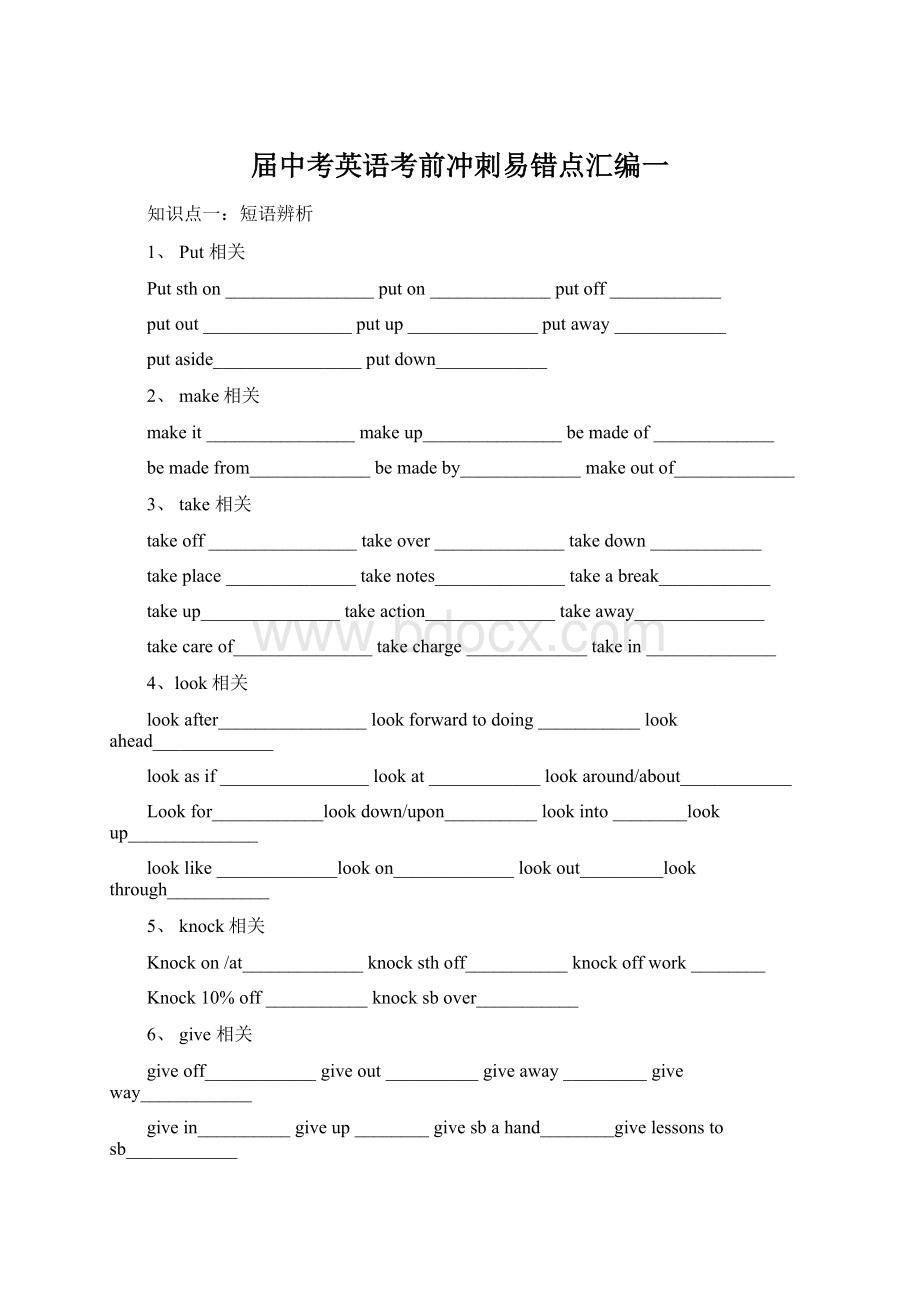届中考英语考前冲刺易错点汇编一.docx
《届中考英语考前冲刺易错点汇编一.docx》由会员分享,可在线阅读,更多相关《届中考英语考前冲刺易错点汇编一.docx(14页珍藏版)》请在冰豆网上搜索。

届中考英语考前冲刺易错点汇编一
知识点一:
短语辨析
1、Put相关
Putsthon________________puton_____________putoff____________
putout________________putup______________putaway____________
putaside________________putdown____________
2、make相关
makeit________________makeup_______________bemadeof_____________
bemadefrom_____________bemadeby_____________makeoutof_____________
3、take相关
takeoff________________takeover______________takedown____________
takeplace______________takenotes______________takeabreak____________
takeup_______________takeaction______________takeaway______________
takecareof_______________takecharge_____________takein______________
4、look相关
lookafter________________lookforwardtodoing___________lookahead_____________
lookasif________________lookat____________lookaround/about____________
Lookfor____________lookdown/upon__________lookinto________lookup______________
looklike_____________lookon_____________lookout_________lookthrough___________
5、knock相关
Knockon/at_____________knocksthoff___________knockoffwork________
Knock10%off___________knocksbover___________
6、give相关
giveoff____________giveout__________giveaway_________giveway____________
givein__________giveup________givesbahand________givelessonstosb____________
7、get相关
getup__________getonwith_________getmarried____________geton_________getoff___________get/beusedto_______get….intotrouble________getoutof_______
gettiredof_______getthrough__________getaway_____________
8、turn相关
turnon_________turnoff___________turnup_________turndown_______
turnout_________turnaround________turnover______turntosbforhelp_______
9、send相关
sendout________sendaletter_________sendoff_________sendaway______
10、keep相关
Keepinmind__________keepintouch___________keepsbfromdoing__________
Keepaneyeon_________keepondoing___________keepupwith_______________
11、break相关
breakdown___________breakin/into__________breakout__________breakup________
breakintopieces________breakone’sheart____________breakoff____________
12、pick相关
Pickout___挑出/选出____pickup__捡起/接/__pickon__作弄___pickat__找茬___
13、way相关
Intheway_____________ontheway__________inthisway_______inaway_____
Bytheway____________alltheway__________insomeways_____inmanyways_______
14、go相关
goout________________goover___________goondoing_________goup______
15、make相关
makeout_____________makealiving_______makeamistake_________makemoney______
makefunof__________makeanoise_______makeprogress________makefriendswith_____
16、think相关
Thinkabout__________thinkof__________thinkover____________
17、carry相关
Carryon____________carryout_________carryonwith__________
18、call相关
Callonsb.____________callatsw._________callouttosb.__________calloff_________
知识点二:
相似词/短语的区分
1、lend与borrow的区别:
2、anumberof与thenumberof的区别:
3、infrontof与inthefrontof的区别:
4、receive与accept的区别:
5、take/bring/get/fetch的区别:
6、takepartin/join/joinin/enterfor/attend表示参加的区别:
7、pay/spend/cost/take表示花费的区别:
8、withpleasure/mypleasure的用法区别
9、except/exceptfor/apartfrom/besides的用法区别:
10.arriveat、arrivein/getto/reach的用法区别:
11、little/alittle/few/afew的用法区别:
12、pass/past的用法区别:
13、cross与across的用法区别:
14、because与becauseof的用法区别:
15、usedtodo/beusedtodo/get、beusedtodoing的区别
16、sometime/sometime/sometimes/sometimes的区别
17、exercise/exercises/experience/experiences/success/asuccess的区别
18、tenminutes’walk与ten-minutewalk区别(9years’old与9-year-old)
19、match与fit的用法区别
20、bestrictwith与bestrictin的区别
21、what与how引导的感叹句的区别
22、such…that….与so…..that的用法区别
23、have/hasgoneto、have/hasbeento、have/hasbeenin的区别
24、whatdoyouthinkof?
与howdoyoulike..?
25、whatdoesyoursisterlooklike?
等于什么?
26、providesb.withsth.与providesth.forsb.的同义词短语是什么?
27、Howoften/Howsoon/Howlong/Howfar的用法区别
28、toomuch/toomany/muchtoo/very的用法区别
29、remembertodo/doing、forgettodo/doing、regrettodo/doing、stoptodo/doing、
Meantodo/doing、goontodo/doing、can’thelptodo/doing的用法区别
30、alive;lively;live;living的用法区别
31、lie(说谎)、lay(放置、下蛋)、lie(躺、位于)的区别
32、thekeytothedoor/theanswertothequestion/thetickettotheconcert的用法
33、inthetree/onthetree、inthehair/onthehair、intheface/ontheface的区别
34、方位介词on/to/in表示方位时的用法区别
35、Howwouldyoulikeyourcoffee?
与Howdoyoulikeyourcoffee的区别
36、other,theother,another与others的用法区别
37、noone,none与nothing的用法区别
知识点三:
语法易错点提醒
1、非谓语动词的使用
2、不能使用被动语态的几种情况;
(1)谓语为连系动词时,不用被动语态。
如:
Helookedfine.他气色好。
Thefoodtastesdelicious.这食物味道很好。
(2).谓语为不及物动词(短语)时,不用被动语态。
如:
Thewarbrokeoutintheend.战争终于爆发了。
Ihappenedtomeethimthere.我碰巧在哪儿见到了他。
(3).宾语为不定式、动词的-ing形式或从句,表示主语的一些想法、爱好或愿望时,一般不用被动语态。
如:
Hedecidedtogowithus.他决定跟我们一起去。
Iwanttobuyacomputer.我想买一台电脑。
(4).宾语是相互代词、反身代词、同源宾语等时,一般不用被动语态。
如:
Weshouldhelpeachother.我们应该相互帮助。
Weliveahappylifehere.我们在这儿过着幸福的生活。
Hethinksofhimselftoomuch.他对自己想得太多。
(5).宾语是处所、地点时,一般不用被动语态。
如:
Wewillreachthestationintwohours.我们再过两个小时就会到站了。
HehasgonetoLondonnow.他去伦敦了。
(6).谓语部分(动词与宾语)是一个不可分割的动词短语时,一般不用被动语态。
如:
Hesmiledabigsmileonhisface.他面带微笑的大笑起来。
Theshipsetsailthismorning.这艘轮船今天早晨起航了。
Hesawthedoctoryesterdayevening.他昨天晚上看了医生。
(7).部分动词与easily、well连用表示物体本身所具有的特性时,不用被动语态
如:
Thebooksellswell.(对的)Thebookissoldwell.(错的)
Theclothwashedeasily(对的)Theclothwaswashedeasily.(错的)
Thecardriveseasily(对的)Thecarisdriveneasily.(错的)
3、现在完成时的用法
(1)It’sthreeyearssincehethearmy.
(A)hasjoined(B)hasbeenin(C)join(D)joined
(2)Mrswhitesisn'there,sheLondon,shetheremanytimes
(A)hasbeento,went(B)hasgoneto,hasbeen
(C)wentto,hasgone(D)hasbeento,hasgone
(3)Shehas__________toBeijingtwice.
(A)gone(B)got(C)been(D)come
(4)—whereyourfather,LiLei?
—ToBeijing
(A)have,been(B)has,been(C)have,gone(D)has,gone
(5)MrGreenisn'tintheoffice,Hetothelibrary
(A)hasgone(B)went(C)hasbeen(D)willgo
(6)MrsmithtoTokyoandhewillbebackinaweek
(A)hasbeen(B)hasvisited(C)hassent(D)hasgone
(7)--haveyoubeenhere?
--Sincelastyear
(A)Howfar(B)Howlong(C)Howoften(D)Howsoon
(8)_____hasHanmeibeeninthelibrary.
(A)Howlong(B)Howsoon(C)Howfar(D)Howoften
(9)Howlong___he___thelibrarybook.
(A)has,borrow(B)has,kept(C)has,bought(D)did,buy
(10)—HowlongcanIthisbook?
—Twoweeks
(A)borrow (B)keep (C)lend(D)return
(11)Herfatherin1990andherhusbandformorethanfiveyears
(A)died,dead(B)hasdied,dead(C)died,hasbeendead(D)hasdied,hasdied
(12)Ihavethisnicewatchfortwoyears (A)had(B)bought(C)borrowed(D)lend
(13)Hehishomefortenyears
(A)hasleft(B)leftfrom(C)hasbeenawayfrom(D)wasawayfrom
(14)Healeaguememberforthreeyears
(A)is(B)hasbeen(C)hasbecome(D)havebecome
(15)Lihua'sbrotherhasfortwoyears
(A)joinedthearmy(B)beenanarmy(C)becomeasoldier(D)beeninthearmy
(16)Hehasn'tQuanzhoueversinceheleftschool
(A)left(B)beenaway(C)been(D)away
(17)—Haveyoufinshedyourhomework—Yes,Iitlastnight
(A)finish(B)finished(C)havefinished(D)willfinish
(18)—youevertoNanjing—Yes,Itherelastyear.
(A)Have…gone,havegone(B)Have…been,went
(C)Did…go,went(D)Did…go,has,been
(19)—WhenyouLucyinNewYork?
—Iherefortwoyears
(A)did…meet,haven'tseen(B)did…meet,haven'tseen
(C)did…meet,don'tsee(D)would…meet,hadn'tseen
(20)-when_youtoBeijing?
Howlongyouhere?
(A)have…come,have…been(B)did…come,have…been
(C)did…come,did…go(D)did…come,have…gone
4、反义疑问句的使用:
不定代词当陈述部分的主语时
(1)用one时,后面的疑问句可用one/he.
(2)everything,anything,nothing,something时,附加疑问句中主语用it不用they
(3)this,that,或those,these时,附加疑问句中主语用it或they.
(4)everyone,everybody,someone,somebody,anyone,nobody等,附加疑问句中主语一般用he(书面语)/they(口头语).
(5)不定式,动名词,其他短语,附加疑问句中主语一般用it。
(6)在therebe句型中,附加疑问句中主语一般用be/情态动词/助动词+there
否定意义的词
(1)当陈述部分有never,seldom,hardly,few,little,barely,scarcely,nothing,none,rarely等否定意义的词汇时,后面的反意疑问句则为肯定形式:
Therearefewapplesinthebasket,arethere?
Hecanhardlyswim,canhe?
Theyseldomcomelate,dothey?
(2)当陈述部分含有否定意思的词是unhappy,dislike,unfriendly,等含有否定词缀的派生词,也就是有un,dis,no-前缀、less-后缀等含有词缀而意思否定的词,当做肯定句处理,疑问部分要用否定形式。
如:
Helooksunhappy,doesn'the?
他看上去不高兴,不是吗?
Thegirldislikeshistory,doesn'tshe?
这女孩不喜欢历史,不是吗?
有less,fewer等词视为肯定词,疑问部分用否定形式。
如:
Therewillbelesspollution,won'tthere?
表示主语主观意愿的词
含有think,believe,suppose,imagine,expect等动词后接宾语从句构成的主从复合句在构成反意疑问句时,视情况不同有两种不同的构成方式。
(1)当主句的主语为第一人称时,其后的简短问句应与从句相一致。
如:
IexpectourEnglishteacherwillbebackthisweekend,won'tshe/he?
Wesupposeyouhavefinishedtheproject,haven'tyou?
值得注意的是,当这些动词后接的宾语从句的否定转移到主句时,其仍属否定句,故其后的简短问句应用肯定式,而非否定式。
例如:
Idon'tbelievethathecantranslatethisbook,canhe?
Wedon'timaginethetwinshavearrived,havethey?
此类句子的回答同"前否后肯"型反意疑问句一样,如上述后一个句子,若双胞胎已经到了,则回答为"Yes,theyhave.";若尚未到达,使用"No,theyhaven't."。
(2)当主句的主语为第二、三人称时,其后的简短问句则应与主句相一致(此时,否定只看主句,与从句无关)。
例如:
Yoursistersupposessheneedsnohelp,doesn'tshe?
Youthoughttheycouldhavecompletedtheproject,didn'tyou?
Theydon'tbelieveshe'sanengineer,dothey?
Shedoesn'texpectthatwearecomingsosoon,doesshe?
(3)但如果主句的时态是过去时,疑问句应和主句人称时态保持一致。
hadbetter或have陈述部分有hadbetter,或其中的have表示完成时态时,疑问句应用hadn’t等开头:
You’dbettergetupearly,hadn’tyou?
其他情况句中有have时疑问句应用don't等开头
如have表示“有”的时候,有两种形式:
(have表示有可用do或have来改写)
-Hehastwosisters,doesn'the?
=Hehastwosisters,hasn'the?
-Hedoesn'thaveanysisters,doeshe?
祈使句当陈述部分是